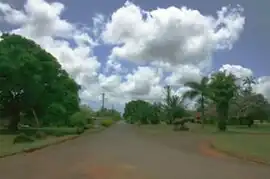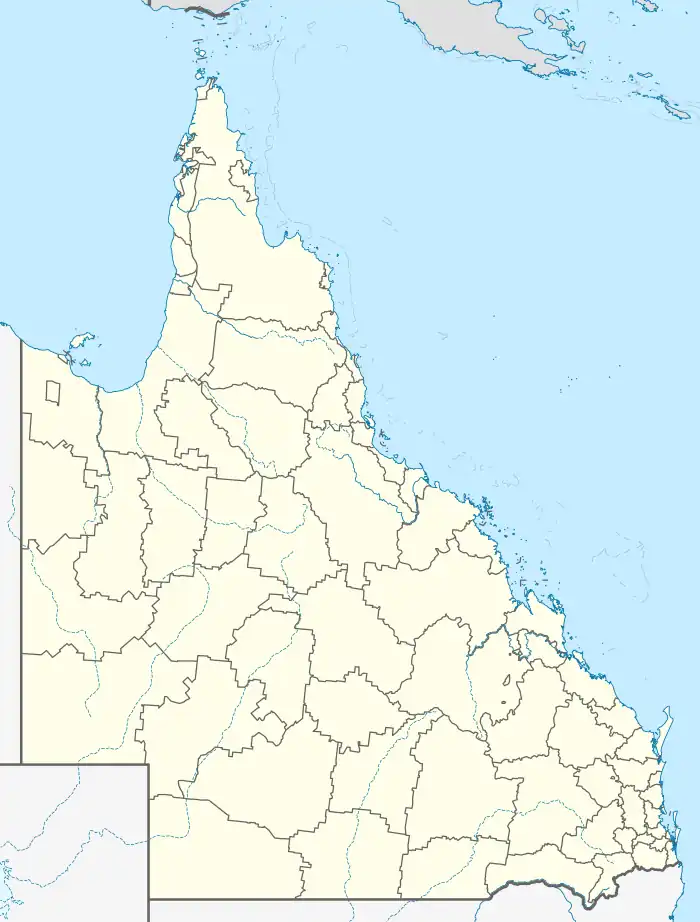| Hope Vale Queensland | |||||||||||||||
|---|---|---|---|---|---|---|---|---|---|---|---|---|---|---|---|
 Hope Vale | |||||||||||||||
 Hope Vale | |||||||||||||||
| Coordinates | 15°17′46″S 145°06′43″E / 15.2962°S 145.1119°E | ||||||||||||||
| Population | 1,015 (2016 census locality)[1] | ||||||||||||||
| • Density | 0.48597/km2 (1.2587/sq mi) | ||||||||||||||
| Postcode(s) | 4895 | ||||||||||||||
| Area | 2,088.6 km2 (806.4 sq mi) | ||||||||||||||
| Time zone | AEST (UTC+10:00) | ||||||||||||||
| Location |
| ||||||||||||||
| LGA(s) | |||||||||||||||
| State electorate(s) | Cook | ||||||||||||||
| Federal division(s) | Leichhardt | ||||||||||||||
| |||||||||||||||



Hope Vale (also known as Hopevale) is a town within the Aboriginal Shire of Hope Vale and a coastal locality split between the Aboriginal Shire of Hope Vale and the Shire of Cook, both in Queensland, Australia.[2][3][4] It is an Aboriginal community. In the 2016 census, the locality of Hope Vale had a population of 1,015 people.[1]
Geography
Hope Vale is on Cape York Peninsula about 46 kilometres (29 mi) northwest of Cooktown by road, and about 10 kilometres (6.2 mi) off the Battlecamp Road that leads to Rinyirru National Park and Laura.
History
Johann Flierl, a missionary of the Lutheran Church, established the Elim Aboriginal Mission (1895; 15°15′27.4″S 145°18′51″E / 15.257611°S 145.31417°E) on the beach of the north shore of Cape Bedford and the Cape Bedford Mission (1886) nearby. While it initially flourished, Elim's future became grim and the people were relocated to Hope Vale.
Owing to fears that the German-influenced Aboriginal people might cooperate with the advancing Japanese in World War II, the total population of 286 was evacuated south to various communities by the military in May 1942. The German Lutheran missionaries were sent to internment camps. Most of the people were sent to Woorabinda, near Rockhampton, in Queensland, where a large number reportedly perished from disease and malnutrition.[5] Hope Vale was re-established as a Lutheran mission in September 1949. Aboriginal people from the Hope Valley and Cape Bedford Missions settled there. A work crew was allowed to return in 1949 and the first families came home in 1950. Hopevale Post Office opened on 1 May 1965 and closed in 1990.[6]
Due to a lack of reliable water supplies at Elim, the community was shifted about 20 kilometres (12 mi) inland to its present site.
Language
Guugu Yimithirr (also known as Koko Yindjir, Gugu Yimidhirr, Guguyimidjir) is an Australian Aboriginal language of Hope Vale and the Cooktown area. The language region includes the local government area of the Aboriginal Shire of Hope Vale and the Shire of Cook, particularly the localities of Cape Bedford, Battle Camp and sections of the Normanby River and Annan River.[7]
Hopevale is home to several clan groups who mostly speak Guugu Yimidhirr and other related languages, as well as English.
Demographics
At the 2011 census, the town of Hope Vale had a population of 974 people.[8] In the 2016 census, the locality of Hope Vale had a population of 1,015 people.[1]
Government
Hopevale is no longer run as a mission by the church but by its own elected community council. In 1986 it received a "deed of grant in trust" (DOGIT) which "granted title to 110,000 ha of land which was previously Aboriginal Reserve Land held by the Under Secretary as trustee, to the community council to act as trustees of the land for the benefit of the residents."[9] The Aboriginal Land Act 1991 (Qld) transferred into Indigenous ownership all previous reserve land under DOGIT (Deed of Grant in Trust) titles.[10]
- "The Warra people of the Hopevale Community of Eastern Cape York Peninsula in Queensland received acknowledgement of their native title rights in December 1997. The determination recognised rights of exclusive possession, occupation use and enjoyment over 110,000 ha. (Native Title Determination, Warra Peoples, Hope Vale Community of Cape York (NNTT ref# QC96/15))"[11]
Education
Hope Vale has a primary (Preparation to Grade 6) campus of Cape York Aboriginal Australian Academy, which is headquartered at the corner of Thiele and Poland Streets in Cairns (15°17′43″S 145°06′29″E / 15.2952°S 145.1080°E).[12][13]
There is no secondary school in Hope Vale. The nearest secondary school is Cooktown State School in neighbouring Cooktown to the south.[14]
On 21 July 2008 the Hope Vale community opened the Indigenous Knowledge and Technology Centre, in the Jack Bambie building at 5 Muni Street. The now-Indigenous Knowledge Centre was established in partnership with Hope Vale Aboriginal Shire Council, the State Library of Queensland, Dot Com Mob, SJB Architects, Work Ventures, and the AMP Foundation.[15] This centre provides a library service, training venue, and public Internet access.[16]
Modern culture
The Hope Vale community has a strong choral singing tradition since its evacuation to Woorabinda. The ensemble has performed at the Queensland Music Festival on three occasions—in 2005, 2007 and 2009.
Notable people
- Eric Deeral (1932–2012), who was the second Australian Aboriginal person elected to an Australian parliament and the first to a state parliament.
- Queensland rugby league player Matt Bowen (born 1982).
- Lawyer and activist Noel Pearson (born 1965), who has criticised the level of violence in the community.[17]
Gallery
 Hope Vale Arts Centre
Hope Vale Arts Centre Hope Vale Art Centre Opening in April, 2009
Hope Vale Art Centre Opening in April, 2009
See also
- List of Indigenous Australian politicians
- Marie Yamba Aboriginal Mission, a mission situated south of Proserpine that commenced in 1897 and finished in 1902 with 24 Aboriginals being moved to Hope Vale Mission.[18]
References
- 1 2 3 Australian Bureau of Statistics (27 June 2017). "Hope Vale (SSC)". 2016 Census QuickStats. Retrieved 20 October 2018.
- ↑ "Hope Vale – town (entry 16117)". Queensland Place Names. Queensland Government. Retrieved 13 June 2017.
- ↑ "Hope Vale – locality in Aboriginal Shire of Hope Vale (entry 45790)". Queensland Place Names. Queensland Government. Retrieved 13 June 2017.
- ↑ "Hope Vale – locality in Shire of Cook (entry 45790)". Queensland Place Names. Queensland Government. Retrieved 13 June 2017.
- ↑ Hope Vale features in WWII documentary Archived 1 February 2017 at the Wayback Machine. LCA Communications, Lutheran Church of Australia, 4 April 2015
- ↑ Premier Postal History. "Post Office List". Premier Postal Auctions. Archived from the original on 15 May 2014. Retrieved 10 May 2014.
- ↑
 This Wikipedia article incorporates CC-BY-4.0 licensed text from: "Guugu Yimithirr". Queensland Aboriginal and Torres Strait Islander languages map. State Library of Queensland. Retrieved 28 January 2020.
This Wikipedia article incorporates CC-BY-4.0 licensed text from: "Guugu Yimithirr". Queensland Aboriginal and Torres Strait Islander languages map. State Library of Queensland. Retrieved 28 January 2020.
- ↑ Australian Bureau of Statistics (31 October 2012). "Hope Vale (UCL)". 2011 Census QuickStats. Retrieved 26 January 2016.
- ↑ Pearson, N (1989). "The Deed of Grant in Trust and Hope Vale Aboriginal Community, North Queensland". Aboriginal Law Bulletin. Archived from the original on 16 May 2017. Retrieved 19 March 2018. (1989) 1(38) Aboriginal Law Bulletin 12.
- ↑ "Aboriginals & Torres Strait Islanders - Legislation - Queensland". WorldLII. Archived from the original on 4 August 2008.
- ↑ Strelein, Lisa. "Mabo/Hopevale & Aboriginal Land, 1997". mabonativetitle.com. Archived from the original on 14 July 2011.
- ↑ "State and non-state school details". Queensland Government. 9 July 2018. Archived from the original on 21 November 2018. Retrieved 21 November 2018.
- ↑ "Hopevale Campus of CYAAA". Archived from the original on 22 February 2017. Retrieved 21 November 2018.
- ↑ "Queensland Globe". State of Queensland. Retrieved 19 February 2021.
- ↑
 This Wikipedia article incorporates text from From message stick to memory stick (21 July 2022) by Indigenous services published by the State Library of Queensland under CC BY licence, accessed on 18 January 2023.
This Wikipedia article incorporates text from From message stick to memory stick (21 July 2022) by Indigenous services published by the State Library of Queensland under CC BY licence, accessed on 18 January 2023.
- ↑ "Hope Vale (Jack Bambie Memorial Centre)". plconnect.slq.qld.gov.au. State Library of Queensland. Archived from the original on 22 January 2018. Retrieved 22 January 2018.
- ↑ "Noel Pearson: Vale hope in outback hellhole - Opinion - The Australian". 13 June 2007. Archived from the original on 13 June 2007. Retrieved 19 March 2018.
- ↑ "Mainland communities L-M". slq.qld.gov.au. State Library of Queensland. Archived from the original on 19 March 2018. Retrieved 27 June 2017.
Further reading
- McIvor, Roy (2010). Cockatoo: My Life in Cape York. Stories and Art. Roy McIvor. Magabala Books. Broome, Western Australia. ISBN 978-1-921248-22-1.
- Pohlner, Howard, J. 1986. gangurru. Hopevale Mission Board, Milton, Queensland. ISBN 1-86252-311-8
- Poland, Wilhelm. Loose leaves; reminiscences of a pioneer North Queensland Missionary. originally published as three booklets by The Mission Institute of Neuendettelsau, Bavaria, 1905–1912. Reprint: Lutheran Publishing House, Adelaide. 1988. ISBN 0-85910-468-0
- Roth, W. E. 1897. The Queensland Aborigines. 3 Vols. Reprint: Facsimile Edition, Hesperian Press, Victoria Park, W.A., 1984. ISBN 0-85905-054-8.
- Sutton, Peter (ed). Languages of Cape York: Papers presented to a Symposium organised by the Australian Institute of Aboriginal Studies. Australian Institute of Aboriginal Studies, Canberra. (1976). ISBN 0-85575-046-4.
- Wynter, Jo and Hill, John. 1991. Cape York Peninsula: Pathways to Community Economic Development. The Final Report of The Community Economic Development Projects Cook Shire. Cook Shire Council.
External links
- "A War of Hope" (2015). A 52-minute documentary on the life of Elder and artist, Roy McIvor, telling of the cruel forced removal of the Cape Bedford Mission Aboriginal people in 1942, their return in 1949 - a story of great suffering and reconciliation
- Aboriginal Co-ordinating Council website.
- Queensland Stories - Hope Vale Water at the Library of Congress Web Archives (archived 3 July 2009)
- Queensland Stories - Hope Vale's War at the Library of Congress Web Archives (archived 3 July 2009)
- University of Queensland: Queensland Places: Hope Vale Aboriginal Shire Council
- State Library of Queensland, John Oxley Library Blog, 2009. Queensland Stories - Three new digital stories
- State Library of Queensland, John Oxley Library Blog, 2017. 75th Anniversary of the Hope Valley Evacuation
- Weaving Exchange: Erub Island and Hopevale, footage of weaving workshop run by a group of weavers from Erub, Torres Strait and Hope Vale, Cape York. Available on State Library of Queensland catalogue